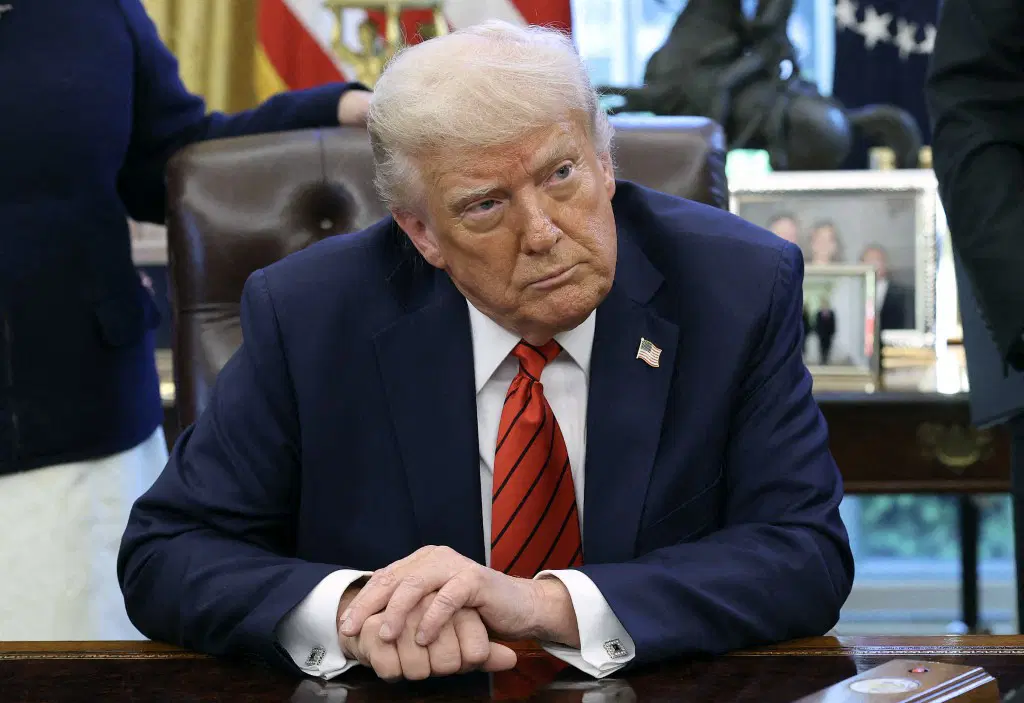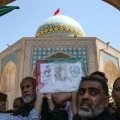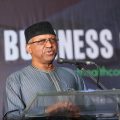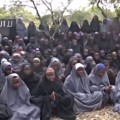International News
Nigeria’s Export Prospects Threatened as Trump Eyes 10% Tariff on BRICS Nations
Published
7 months agoon

Trump’s Tariff Threat May Deepen Nigeria’s Economic Woes, Experts Warn
Nigeria’s fragile economy could suffer further decline if former U.S. President Donald Trump follows through with his proposed additional tariff on countries aligning with the BRICS bloc, experts have warned.
The BRICS alliance—comprising Brazil, Russia, India, China, and South Africa—has recently attracted Nigeria’s interest as it seeks new economic partnerships. However, Trump’s threat of an extra 10% trade tariff on such countries may escalate Nigeria’s import duties into the U.S. to 24%, following an earlier 14% levy introduced on April 2 during what he called “Liberation Day.”
Analysts say the move could significantly dampen Nigeria’s ongoing efforts to diversify its exports beyond oil.
“This kind of tariff escalation sends a strong signal to economies like Nigeria that are trying to gain footing in global markets,” said a Lagos-based economist. “It jeopardizes our access to critical markets like the U.S., where we’ve been working to expand non-oil exports.”
The new tariff threat comes on the heels of criticism by BRICS leaders at a recent summit in Brazil, where they described the import levies as “indiscriminate” and damaging to global trade stability.
Trump had initially announced a blanket 10% tariff on imports from 185 countries, including Nigeria, singling out certain nations for even higher duties—actions that sparked trade tensions with major U.S. partners, especially China.
With Nigeria already grappling with inflation, currency devaluation, and weak foreign reserves, experts fear that further restrictions on its exports could aggravate its economic challenges.
Trump Offers Temporary Reprieve on Tariffs, but BRICS Warns of Global Economic Fallout
Former U.S. President Donald Trump has defended his decision to impose sweeping tariffs on countries aligning with BRICS, saying the levies are not fully reciprocal but necessary. While he admitted he could have made them tougher, Trump said it would have been “difficult for a lot of countries.”
He has, however, granted a three-month reprieve to allow affected nations time to negotiate new trade deals with the U.S. So far, only the United Kingdom and Vietnam have reached agreements with Washington. The U.S. and China have also temporarily agreed to ease some of the sharply escalated duties on each other’s goods.
Trump issued a firm warning that unless countries secured individual deals by August 1, he would move ahead with unilateral levies.
“We’re giving everyone a fair chance, but if they don’t want to work with us, we’ll go ahead and impose the tariffs,” Trump said.
In response, the BRICS bloc—which includes Brazil, Russia, India, China, and South Africa—has strongly condemned the move. In a joint statement on Sunday, BRICS leaders described the unilateral tariff measures as illegal, arbitrary, and harmful to the global economy.
Trade experts warn the standoff could reignite global trade tensions, with developing economies like Nigeria potentially bearing the brunt.
“These arbitrary trade threats undermine multilateral trade systems and disproportionately hurt emerging markets,” one trade analyst noted.
Nigeria, which faces a potential 24% import duty into the U.S. under Trump’s revised plan, is yet to respond or negotiate a deal, placing its export ambitions at risk amid ongoing economic strain.
Trump Targets BRICS with New 10% Tariff Threat, Includes Nigeria Among Penalized Nations
Former U.S. President Donald Trump has vowed to impose an additional 10% tariff on all nations aligned with the BRICS bloc, escalating his trade war rhetoric and placing Nigeria in the crosshairs of the policy.
In a post on his Truth Social platform on Sunday, Trump said:
“Any country aligning themselves with the anti-American policies of BRICS will be charged an additional 10 per cent tariff. There will be no exceptions to this policy.”
The warning comes amid growing tensions between the United States and the expanding BRICS alliance, which now includes 11 full members and a growing list of partner countries.
The BRICS bloc—originally Brazil, Russia, India, China, and South Africa—was expanded in 2024 to include Egypt, Ethiopia, the United Arab Emirates, Iran, Saudi Arabia, and Indonesia. Nigeria formally became the ninth partner country in January 2025, alongside Belarus, Bolivia, Cuba, Kazakhstan, Malaysia, Thailand, Uganda, and Uzbekistan.
The expanded alliance was formalized during the 16th BRICS Summit held in Kazan, Russia, in October 2024, where the new “partner-country” category was established to increase global cooperation with developing nations.
Trump’s threat adds to the economic uncertainty facing Nigeria, which risks further marginalization in U.S. trade if the tariff is implemented. Experts fear the additional levies could undercut Nigeria’s fragile export sector and heighten inflationary pressures, especially at a time when the country is seeking alternative trade partnerships through BRICS.
Tinubu Attends BRICS Summit as Nigeria’s Economic Struggles Deepen
President Bola Tinubu is participating in the ongoing BRICS summit following an invitation from Brazilian President Luiz Inacio Lula da Silva. Nigeria, which holds the status of a “partner country” within the BRICS framework, is engaging with the bloc as part of efforts to strengthen global alliances and stabilize its economy.
The “partner country” designation—granted during the 16th BRICS Summit in Kazan, Russia, in 2024—gives Nigeria a foothold in the group without full membership status, offering new avenues for economic and diplomatic cooperation.
Despite its ranking as Africa’s largest economy, Nigeria is grappling with significant economic headwinds. High inflation, a volatile oil market, and an urgent need for economic diversification continue to strain national development.
The country’s economic decline accelerated after 2023, with headline inflation hitting 28.92% by December 2023—up from 18.85% in 2022. By June 2024, inflation had surged to a staggering 34.2%, further compounding hardship for millions of Nigerians.
However, there has been a slight improvement in recent months. According to the Central Bank of Nigeria (CBN), inflation eased to 27.50% in the most recent data release, offering a glimmer of hope for economic recovery.
Tinubu’s presence at the BRICS summit signals a strategic move to align with emerging global powers, as Nigeria seeks to reposition itself amid shifting geopolitical alliances and ongoing domestic challenges.
Experts Warn Extra U.S. Tariff Could Hit Nigeria’s Oil Exports Hard
Economists have raised alarm over the potential impact of a proposed 10% tariff hike by the United States on BRICS-aligned nations, warning that Nigeria’s key export—crude oil—could be severely affected.
The Central Bank of Nigeria’s Monetary Policy Committee has kept the benchmark interest rate steady for two consecutive meetings, including its May 2025 session, in a bid to maintain macroeconomic stability. This follows major policy reforms by the Federal Government, including the removal of fuel subsidies and the flotation of the naira, both aimed at reviving the struggling economy.
Despite these efforts, Nigeria’s GDP growth has remained inconsistent, averaging just 2.3% over the decade leading up to 2023. Analysts say the U.S. tariff threat could further derail growth projections by targeting Nigeria’s dominant export.
Crude oil and petroleum products account for more than 90% of Nigeria’s exports to the United States, forming the backbone of trade relations between the two countries. The proposed 10% surcharge—on top of an existing 14% import levy introduced in April—would raise Nigeria’s effective tariff rate to 24%, significantly weakening its competitiveness in the U.S. energy market.
“If implemented, this additional tariff could drastically reduce Nigeria’s oil exports to the U.S., disrupt foreign exchange earnings, and worsen fiscal pressures,” said an Abuja-based economic analyst.
With Nigeria’s economy already under strain, the escalating trade tensions between BRICS and the U.S. could not come at a more vulnerable time.
Nigeria’s limited exports to the United States—such as fertiliser, agricultural produce, and manufactured items—represent a small slice of its overall trade with the US.
Despite America being a key economic partner, Nigeria accounts for only a minor share of total US trade activity.
However, recent analyses warn that additional US tariffs on Nigeria’s non-oil exports could hinder the country’s ongoing push to broaden its export portfolio beyond crude oil.
Nigeria’s overdependence on petroleum exports leaves its economy highly susceptible to global price shocks and demand shifts—an ongoing vulnerability in its development strategy.
Meanwhile, President Bola Tinubu has reiterated the need for a comprehensive overhaul of the global economic and governance systems, advocating for fairer structures that support the aspirations of developing nations, especially in Africa.
At the BRICS summit, President Bola Tinubu called for a fundamental overhaul of global governance, economic frameworks, and healthcare systems, urging world leaders to embrace a more just and inclusive international order—one that genuinely considers the voices and interests of developing nations, particularly in Africa.
In a statement released by his spokesperson, Bayo Onanuga, Tinubu highlighted the disproportionate impact of global issues—such as environmental degradation, climate change, and unequal access to healthcare—on African countries, despite their minimal contribution to these problems.
“Africa bears the brunt of global emissions it did little to cause,” Tinubu stated, stressing that fairness, equal opportunity, and access to affordable financing must form the foundation of a new international agreement, supported by responsible technology transfer and locally driven solutions.
Reaffirming Nigeria’s support for the BRICS agenda of reshaping global power dynamics, Tinubu added: “We must now move toward financial restructuring and a reevaluation of the current global order.”
President Tinubu emphasized that developing nations must no longer remain on the sidelines of global decision-making, especially on issues that determine their collective future.
He reaffirmed Nigeria’s active role in international and regional climate efforts, citing initiatives like the African Carbon Market Initiative and the Great Green Wall as key examples of the country’s environmental commitment.
Tinubu also highlighted Nigeria’s Vision 2050—a strategic framework focused on sustainability through youth empowerment, climate resilience, and equitable healthcare.
“Nigeria is a strong advocate for South-South cooperation,” he stated. “We refuse to be mere observers in shaping policies around debt restructuring, climate finance, and universal healthcare access.”
Looking ahead to COP-30, the President called for deeper global partnerships to combat non-communicable diseases and strengthen healthcare systems capable of withstanding future crises.
“BRICS should stand not only as a collective of emerging economies but as a platform for innovative, homegrown solutions,” President Tinubu asserted, emphasizing the need for unity, economic self-sufficiency, and a forward-looking vision anchored in sustainability and shared progress.
Experts: U.S. Tariff Hike Threatens Nigeria’s Export Diversification Goals
Economic analysts have raised concerns that the proposed U.S. tariff increase could significantly disrupt Nigeria’s efforts to broaden its export base beyond oil.
Tunde Abidoye, Head of Equity Research at FBNQuest Merchant Bank, warned that the additional levies would erode the competitiveness of Nigeria’s non-oil exports.
He explained, “If the United States proceeds with higher reciprocal tariffs on Nigerian goods, it could shrink foreign exchange earnings from exports and create added strain on government revenues.”
U.S. Tariff Hike Threatens Nigeria’s Export Stability, Say Analysts
Despite Nigeria exporting goods worth $5.7 billion to the United States in 2024, a potential increase in U.S. tariffs could negatively impact the country’s already fragile efforts to grow its non-oil export sector.
Experts caution that such a move may undercut Nigeria’s competitive edge in global markets.
“This development could stall the progress made in diversifying Nigeria’s export portfolio and weaken current momentum,” one analyst noted.
Egbomeade: New Tariff Threatens Economic Stability, Sends Worrying Signal
Clifford Egbomeade, a Public Economic and Communications Analyst, described the proposed 10% tariff hike by former President Donald Trump on BRICS-aligned nations as a significant moment for Nigeria’s economy.
“This is both a geopolitical and economic turning point that could heighten Nigeria’s vulnerability,” he explained.
He added that while over 90% of Nigerian exports to the U.S. are oil-based—and may be less immediately affected due to consistent global demand—the broader implications are troubling.
“It sends a clear message to developing nations looking to shift away from traditional alliances and diversify trade partnerships,” Egbomeade said.
Analyst: Tariff Risks Could Undermine Nigeria’s Economic Goals and Investor Confidence
Experts warn that the broader impact of the proposed U.S. tariff hike may be more damaging than it first appears, especially for Nigeria’s fragile non-oil sectors.
“The deeper concern lies in how this could stifle Nigeria’s already-vulnerable export industries like agriculture and manufacturing,” one economic strategist noted. “These sectors are just beginning to gain ground and remain critical for job creation and long-term diversification.”
He added that beyond trade, the psychological impact on global investors could be significant.
“When diplomatic ties with a major trading partner like the U.S. appear tense, foreign direct investment often pulls back,” he said.
Diplomatically, this situation presents a real test for Nigeria.
“With Nigeria now aligned with BRICS, the country faces the challenge of balancing new strategic alliances with the need to preserve vital trade relationships,” the analyst explained.
He emphasized the need for proactive diplomacy and strategic positioning:
“Nigeria must engage in high-level dialogue to secure exemptions or concessions from the U.S., while deepening trade within Africa through the AfCFTA. The goal is not to choose sides but to build resilience—so we can engage all partners from a position of strength.”
Extra Tariffs Will Hit Nigeria’s Export Revenues – Adonri
David Adonri, Executive Vice Chairman of Highcap Securities Limited, has warned that the proposed 10 percent increase in U.S. tariffs on Nigerian goods could significantly erode the competitiveness of the country’s exports, ultimately reducing foreign exchange earnings.
“A hike in tariffs will make Nigerian goods less attractive in the U.S. market, which is a major destination for some of our non-oil exports,” Adonri said. “This will undoubtedly shrink our export revenue.”
He stressed that Nigeria must respond by aggressively pursuing new international markets and strengthening regional trade ties to cushion the blow of such unfriendly trade measures.
“To mitigate these kinds of shocks going forward, we need to prioritize economic self-reliance. Nigeria has an abundance of productive resources—our current struggles are largely due to poor economic management over the years,” he added.
Adonri argued that with the right policies and leadership, Nigeria could insulate itself from external economic pressures and turn its potential into sustainable growth.
You Might Also Like These
 Trump Dismisses Musk’s Political Party as ‘Ridiculous’
Trump Dismisses Musk’s Political Party as ‘Ridiculous’
 Iran Says At Least 610 Killed, 4,700 wounded since start of Israeli strikes
Iran Says At Least 610 Killed, 4,700 wounded since start of Israeli strikes
 COVID-19: NCDC denies claim of officials rejecting people for testing
COVID-19: NCDC denies claim of officials rejecting people for testing
 Top 20 Best Universities in Nigeria (2025 Ranking)
Top 20 Best Universities in Nigeria (2025 Ranking)
 Excited ADC Loyalists Flock to Lagos Airport to Greet Aregbesola
Excited ADC Loyalists Flock to Lagos Airport to Greet Aregbesola
 Tension As Nnamdi Kanu Parents’ Burial Holds Today
Tension As Nnamdi Kanu Parents’ Burial Holds Today
 Boko Haram Invades Two Towns In Adamawa
Boko Haram Invades Two Towns In Adamawa
 Health Minister speaks on Buhari lifting lockdown
Health Minister speaks on Buhari lifting lockdown
 I’m Not Involved With Sale of Power Company-First Lady
I’m Not Involved With Sale of Power Company-First Lady
 Nigerian Military Rescue Nearly 300 Women, Girls From Boko Haram Stronghold
Nigerian Military Rescue Nearly 300 Women, Girls From Boko Haram Stronghold
 Davido accuses Ibiza night club security guards of trying to kll him and his team
Davido accuses Ibiza night club security guards of trying to kll him and his team
 21 Confirmed Dead in Tragic Accident on Zaria–Kano Highway
21 Confirmed Dead in Tragic Accident on Zaria–Kano Highway
